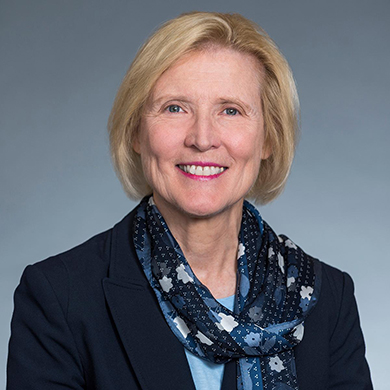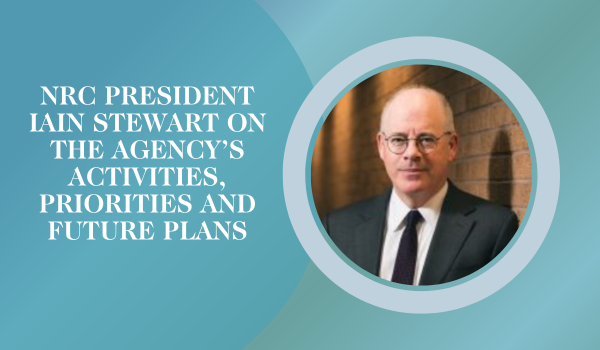Research, business and civil society leaders offer a value proposition for research
Some top stakeholders in Canada’s research and innovation community want to have a conversation with Canadians – including politicians – about the value of research.
Nearly 30 research, business and civil society leaders provided input into a new document, “Research in Canada, for Canada: A value proposition.” The Canada Foundation for Innovation (CFI) coordinated the initiative.
 “We need a narrative that tells the story, that explains the benefits of research to all Canadians because we don’t ordinarily, or we may not ordinarily, think about them,” Roseann O'Reilly Runte (photo at right), president of CFI, told Research Money.
“We need a narrative that tells the story, that explains the benefits of research to all Canadians because we don’t ordinarily, or we may not ordinarily, think about them,” Roseann O'Reilly Runte (photo at right), president of CFI, told Research Money.
“All you have to do is look back to the challenge of the [COVID-19] pandemic and we see that research brought us the vaccines and helped us meet the challenge,” she said.
Contributors to the document include such luminaries as: as Iain Stewart, Michael Strong, Ted Hewitt (presidents, respectively, of the National Research Council, Canadian Institutes of Health Research and Social Sciences and Humanities Research Council); Chad Gaffield (CEO, U15 Group of Canadian Research Universities); Eric Meslin (president and CEO, Council of Canadian Academies); Stephen Toope (president and CEO, Canadian Institute for Advanced Research); Perrin Beatty (president and CEO, Canadian Chamber of Commerce); Mona Nemer (chief science advisor of Canada); and Rémi Qirion (chief scientist of Quebec).
“We want to open the door to a thoughtful discussion,” Runte said. “And we want people to realize the real benefits of research through that discussion.”
Runte noted that “research is essential to our health every day, not just when we’re very sick It’s essential to preserving the environment, not just when we have a forest fire but all the time. It’s essential to our economy. When the economy flourishes it’s because research is driving it ahead.”
Canada’s brainpower enables it to do moonshot science despite having a small population, Runte said. She pointed to artificial intelligence as an example, where the global leaders in AI include Yoshua Bengio at Université de Montréal and scientific director of Mila-Quebec Artificial Intelligence Institute, and Geoffrey Hinton at University of Toronto and chief scientific advisor at the Vector Institute.
“Geoffrey Hinton decided to come back to Canada [from the U.S.] and be here because we bought the best equipment for him,” she said.
“What those two people plus the now-multiplied many people around them are doing, thinking to move ahead in science in a way that 25 years ago we didn’t even know existed.
We need to be able to do that again and again,” Runte said. “Research is something that you have to invest in always.”
Runte said the document presents a value proposition for research that includes:
- Research is essential to health, the environment and the economy.
- There’s no competition or choice between whether it’s better to do basic research or applied research; both need each other and both need ongoing support.
- Canada has always depended on natural resources and our most important resource is our population, our people.
- We need to ensure through research that the economy, the environment and Canadians’ health receive the attention, advancement and importance they deserve.
The document contains no specific recommendations or policy suggestions for government, which Runte said was deliberate.
Typically in such documents, “everybody looks for an ask [for funding],” she said. They [politicians] look with a bit of a jaundiced, cynical eye on ‘Here’s a bunch of researchers asking for money for what are their projects.’”
“We wanted to put that totally aside and say, ‘This isn’t about my project. This isn’t about my field. This is about why a country like Canada will succeed better, why we will create a future for our children and their children. And the way we can do it is supporting research.’”
Link between research and successful communities
A key theme in the document is the link between research and how it helps create the conditions needed for successful, thriving Canadian communities.
For example, Trois-Rivières in Quebec showed how you can scale from an idea to manufacturing, and as a result the city has become a global manufacturing centre, Runte said.
The Kitchener-Waterloo region is one of North America’s leading tech ecosystems because it was built around strong research universities and leading research centres, including the University of Toronto, University of Waterloo, Toronto Metropolitan University, Perimeter Institute for Theoretical Physics, Institute for Quantum Computing, and Waterloo Institute for Nanotechnology, she said.
As for smaller communities, the e@UBCO accelerator in Kelowna’s Innovation Centre “is bringing business that is compatible with the region and the regional desires,” Runte added.
The U.S. recognizes the importance of research and research centres as the core that creates the engine that drives the local economy, she said. She pointed to the Biden administration’s US$300-million investment in the National Science Foundation’s Regional Innovation Engines program, which brings together state and local governments, institutions of higher education, labour unions, businesses, and community-based organizations across the nation to galvanize use-inspired research, technology translation and workforce development.
The U.S. budget also included US$50 million in discretionary funding and US$4 billion in new mandatory funding for the Regional Technology and Innovation Hub Program at the Department of Commerce’s Economic Development Administration, to help foster the geographic diversity of innovation and create quality jobs in underserved and vulnerable communities across the nation.
“Research is something that you have to invest in always,” Runte said. “It will contribute to the success of all receptors.”
Canada is rich in natural resources in energy, minerals (including critical minerals) and agriculture, Runte said. Japan produces only 13 per cent of its energy needs, while Canada produces 190 per cent, according to a recent article by Japan’s ambassador to Canada. Japan produces 38 per cent of the calories that an individual needs every day, while Canada produces 250 times that amount.
However, Canada needs to develop its abundant natural resources using technologies, including mineral-extraction technologies, that protect the environment and develop highly qualified personnel who are well paid. Runte said. “When we get it right, we’re going to be able to sell that technology, not just sell the minerals, but sell the technology around the world.”
The value-proposition document includes elements of a roadmap to help address continuing challenges for Canada. These elements are:
- Augment investments to add value to resources extracted
- Increase adoption of technology to address decline in productivity and bolster competitiveness
- Attract and retain talent, preventing a brain drain and its associated loss of expertise and talent
- Encourage the scale-up of homegrown businesses by making risk capital available
- Develop and implement strategies aimed at attracting new ideas and international investment to Canada
- Encourage calculated risk-taking and a desire to win among Canadian businesses.
As for what the contributors to the document expect in the way of a government response, Runte said it would be good if government said: “We understand the importance of research. And we understand why it’s part of all that we do.”
“If this becomes something that people are talking about, the government will talk about it, too,” she added.
Runte said she recently was chatting with a group of researchers working on cancer, who told her that before the end of their lives, they want to be sure that nobody ever dies again of cancer. They told her they may not be able to eliminate cancer, but they’ll be able to treat it and cure it.
“People need to hear that story,” Runte said. “If you look at all the challenges the world faces, research is key to solving those challenges.”
R$
Events For Leaders in
Science, Tech, Innovation, and Policy
Discuss and learn from those in the know at our virtual and in-person events.
See Upcoming Events
You have 0 free articles remaining.
Don't miss out - start your free trial today.
Start your FREE trial Already a member? Log in
By using this website, you agree to our use of cookies. We use cookies to provide you with a great experience and to help our website run effectively in accordance with our Privacy Policy and Terms of Service.




